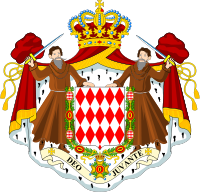- Nationality law of Monaco
-
Monégasque Citizenship is based primarily on the principle of jus sanguinis.
Contents
Eligibility for Monégasque citizenship
By descent
Children who at the time of birth had either mother or father (or both) as Monégasque citizens (regardless of the place of birth) are eligible for Monégasque citizenship.
In addition, children born to a mother of whom one of the ancestors in the same line was born Monégasque are eligible for Monégasque citizenship.
If the child is born of out wedlock, then he/she will only qualify for Monégasque citizenship once recognised/legitimised by the marriage of his/her parents.
By birth
Children born in Monaco of unknown parents are eligible for Monégasque citizenship.
By marriage
A foreign woman can apply for Monégasque citizenship through a right of option after five years of marriage on condition that the spouses live together. In the case of the husband's death, she has to provide evidence that her widowhood was not followed by remarriage.
By declaration
After the age of 18, a person who was born in Monaco of a parent who was either also born Monégasque or who had ancestors of the same branch born Monégasque but who has since renounced Monégasque citizenship can make a declaration before a Registrar provided that he/she lived in the Principality and proves that he/she has had his/her legal domicile or habitual residence there during his childhood.
In addition, those who were born before July 11, 1975, before the acquisition of Monégasque nationality by his father can also make a declaration without conditions concerning the place of birth or habitual residence or legal domicile.
By naturalisation
Those seeking to become Monégasque citizens via naturalisation require to fulfill the following criteria and send their request on stamped paper addressed directly to the Prince:
- renounce any foreign nationality
- no longer be required to perform national service abroad
- has resided in Monaco for a minimum of 10 continuous years since the age of 18 at the time of making the application (the Prince is entitled to waive this requirement if he considers the applicant to be "worthy of this favour")
Monégasque nationality is granted automatically to children who are under 18 when their father or mother survivng her husband (in the event of the death of the latter) obtains naturalization.
Loss of citizenship
A Monégasque automatically forfeits his/her citizenship if he/she:
- acquires a foreign nationality
- performs foreign military service without the prior authorisation of the government of Monaco
- is deemed to have "harmed the internal or external security" of Monaco
A Monégasque citizen may voluntarily renounce their citizenship.
Former Monégasque citizens may restore their former citizenship if their request on stamped paper directly to the Prince is successful.
Dual nationality
Dual nationality is strictly forbidden under Monégasque law.
Nationality laws (category) By continent AfricaAsiaArmenia · Azerbaijan · Bangladesh · Bhutan · Burma (Myanmar) · China · Cyprus (Northern Cyprus1) · India · Indonesia · Iran · Iraq · Israel · Japan · Kazakhstan · South Korea · Lebanon · Malaysia · Mongolia · Nepal · Pakistan · Philippines · Russia · Singapore · Taiwan · TurkeyOceaniaEuropeAndorra · Austria · Belarus · Belgium · Bulgaria · Croatia · Czech Republic · Denmark · Estonia · Finland · France · Germany · Greece · Hungary · Iceland · Ireland · Italy · Kazakhstan · Latvia · Lithuania · Luxembourg · Macedonia · Malta · Moldova · Monaco · Montenegro · Norway · Netherlands · Poland · Portugal · Romania · Russia · Serbia · Slovakia · Slovenia · Spain · Sweden · Switzerland · Ukraine · United KingdomNorth AmericaSouth AmericaInternational
organizationsBy type Other Defunct Notes 1 Partially unrecognised and thus unclassified by the United Nations geoscheme. It is listed following the member state the UN categorises it under.Categories:- Monegasque law
- Nationality law
Wikimedia Foundation. 2010.

